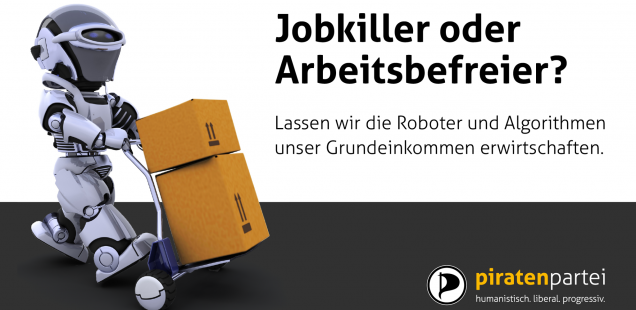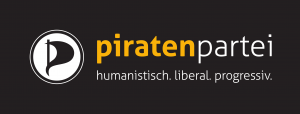Pirates In Switzerland Vote In Favor Of The Basic Income | PirateTimes

Pirates in Switzerland Vote in Favor of the Basic Income
This post is also available in: Spanish
A very significant referendum election has been scheduled on the coming Sunday, June 5, in Switzerland. The popular initiative for an Unconditional Basic Income (UBI), supported by 100.000 citizens, is being presented to the Swiss voters for their scrutiny. It is significant because, in a direct democracy system, such as in Switzerland, whatever is presented to the citizens and voted on is binding for the government.
On Sunday Swiss citizens are going to vote not only on UBI but on five issues in total in a referendum. Pirate Times contacted Guillame Saouli, co-president of Pirate Party of Switzerland (PPCH) and Councilman at Gimel (VD), to ask more about PPCH, Switzerland’s election system, UBI and politics in Switzerland.
Most Pirate Parties support UBI and so does PPCH. Guillame Saouli explained to Pirate Times why Pirate Party Switzerland recommends Swiss citizens to vote in favor of the UBI, although the chances of success on the referendum are rather slim:
“However, in the recent past, there have been huge surprises as for the results, where polls were providing totally erroneous insights, the Swiss folk is sometimes very unpredictable, in particular on such topics”, he emphasized.
The idea of an UBI first appeared at the beginning of the 16th century and has recently caused a big debate worldwide. There is an initiative to urge the citizens of Switzerland to vote “yes” and embrace this historic opportunity to lead the way forward. Switzerland is a mature direct democracy society, where the first ever referendum (it concerned the Constitution) was held in 1798. Since then many referenda have taken place.
At the moment the electoral influence of PPCH is in the range 3-5%, they have about 2000 members, one state MP and three councilmen. The party (founded on July 12, 2009) is steadily developing its political influence and involved in several initiatives and referenda.
We have launched an initiative on the transparency of the funding of polical parties and already collected over 8000 signatures in less then 2 months”, G. Saouli said and underlined that “politics is not done behind a keyboard but in the streets, amongst the population”.

Guillame Saouli, co-president of PPCH
————————-
Pirate Times: How many times do Swiss citizens usually vote per year?
Guillame Saouli: On a normal year, without elections four times a year, the calendar for the next 20 years is made available.
On an election year, depending on the kind of elections, it increases by two more ballots for federal elections, two for state (cantons), and by up to four [more] for local (municipal) elections.
Pirate Times: Are you satisfied with the voters’ turn out, especially in the referenda?
Guillame: Popular votes are not just for referendas but also for initiatives, whether issued by the parliament or by citizen petition. I wish the involvment of the citizens would be higher than the current participation levels. However it varies greatly depending on the subjects presented to the population. It ranges between 32% and 75-80%.
Pirate Times: Are the referenda in Switzerland binding for the goverment?
Guillame: Our democratic system is a direct democracy, and it means that whatever is presented to the citizens and voted on is binding. At federal level, initiatives transforms the constitution and Referenda can be either a constitutional change or the validation of a law. Some law changes are submitted to the People in a compulsory referendum.
[ Editors note: referenda is a democratic process by which a constitutional change or a law has to be presented to the voters for their scrutiny. Citizens by petitioning can impose that a law is to be presented to the people (in this case the petition needs to collect 50’000 signatures) and then they have to decide whether or not to accept the law. The second kind of balloting is called initatives, there are two forms of initiatives, a parliamentary one and a popular one, the later is induced by the petitioning of 100’000 citizens. ]
Pirate Times: On Sunday a popular vote session is going to be held throughout Switzerland on five issues, including the basic income. What does PPCH recommend? Why does PPCH say “yes” to basic income?
Guillame: The general assembly of the PPCH has formally decided to support the Universal Basic Income intiative. The general assembly of the PPCH took into consideration several key arguments:
- The “4th industrial revolution” will bring a wave of “trade destruction”, Switzerland has lived three sectoral transformations, which have brought a great deal of stress on the social protection system in the second half of the 20th century. The PPCH is of the opinion that the social safety net should be strengthened prior to the tidal wave impact.
- Enable individuals to build up knowledge and skills by supporting their basic needs while studying
- Emancipate individuals from the dependency created when caught in the social safety net, by the overwhelming bureaucracy, thus enabling them to get back to regain control of their lives, and reengage into the society rather and stay glued into a maze of administrative processes.
Pirate Times: Is basic income included in the basic principles for PPCH?
Guillame: It is part of our general political goals, and not our core focus. Basic income is a transformational tool, it is not a goal in itself, therefore it is not part of the principles. We have defined a societal vision in which the individual is the center of the construction of society. Our policy statement seeks that every person shall live a decent life and as such having the basic means of existance is an important tool to achieve this goal.
Pirate Times: Has the initiative for the referendum on basic income specified the amount of money per citizen, or it would be specified after it is accepted? What does PPCH say about that amount of money? Is there a specific proposition?
Guillame: There is no specific amount of money stated in the popular initiative, since the minimum social revenue (basic life support pension) is defined regionally, and can greatly vary from one place to another. PPCH has not taken position on the final amount of money, but our debate led to the consensus that this should remain as with the current social support system defined on a regional basis. During the formal debate, the assembly of PPCH didn’t take position on the amount, as it is not part of the core of the initiative.
Pirate Times: What do polls show for the basic income? Will it be accepted or rejected by Swiss citizens?
Guillame: The polls have evolved a little bit, over the course of the past 2 months, with an 2% increase of favorable opinions up to 26%. It is clearly an uphill battle as the debate of the financing of the UBI has been taken over by a lot of different factions attempting to pitch their views on different other topics they have tried to promote, going from anti-capitalism to the “full money initiative”.
The fact that this initiative is rather a study mandate to develop and implement a solution rather than a fully fledged solution, is in itself something of a new breed of initiative, and therefore it has brought upon itself questions, that you don’t generally face in such balloting.
Due to these two factors, the chances of success are rather slim. However, in the recent past, there have been huge surprises as for the results, where polls were providing totally erroneous insights. The Swiss folk is sometimes very unpredictable, in particular on such topics.
Pirate Times: What about the other four issues of the referendum? What does PPCH recommend?
Guillame: For the four other vote objects, PPCH’s general assembly has chosen the following positions:
- In favor of the new version of the Asylum Law
- In favor of the new law on Assisted Medical Procreation
- Rejecting the Initiative “For a improved public service”
- Rejecting the initiative “Fair Road Infrastructure Financing Initiative aka Stop Milking Cows Initiative”
We have published a detailed description in French and German.

Pirate Times: How do you comment on the electoral influence of the Pirate party in Switzerland?
Guillame: We are steadily developing our political influence at a federal level, we are involved in several initiatives and referenda.
We have initiated a parliamentary initiative for a constitutional change to incorporate the notion of “numerical/digital” integrity of the individual, it is following the process and for now it has gained a high level of support within both the state (senate) and the national councils, the people should vote on this within the next 2 years.
We have launched an initiative on the transparency of the funding of polical parties, and it has already collected over 8.000 signatures in less then 2 months (there is a 18 months timeframe to collect 100.000 signatures)
We have successfully initiated a referendum against the “Intelligence Service Law”, which will be presented to the people’s balloting.
In terms of electoral influence, were the Pirate Party is present and active in Switzerland we represent between 3% and 5% of the population. In a very mature direct democracy, the challenge to mobilise people is very high, because politics is not done behind a keyboard but in the streets, amongst the population.
Pirate Times: How many active members are there today in PPCH?
Guillame: PPCH is a 2.000 members strong political organisation with a sympathizer basis of approximately 6.500 across Switzerland.
Pirate Times: How many pirate representatives are there in Switzerland?
Guillame: We currently have 1 State MP, and 3 Local Councilmen:
State MP:
- Jolanda Spiess – Zug
Local reps – Councilmen:
- Marc Wackerlin – Winterthur (ZH)
- Guillaume Saouli – Gimel (VD)
- Gabriel Klein – Council President – (Montpreveyre /VD)
Pirate Times: Which is the common feeling for the politicians in Switzerland? Do Swiss citizens trust them? Do they think that politicians are corrupted?
Guillame: There is no a single common feeling in the sense that there are rather different kinds of relationships to the “politicians”. Apart from the elected executives at state and federal level, there are seldom “professional” politicians. These politicians are “militia” politicians, meaning that they are not cut from the rest of the people.
Trust is good, democratic control is better. The swiss system is quite open, however we can improve it! There is a lack of engagement, therefore a lack of understanding of the means available to control and voice one’s opinion. Most people imagine that the “State” is very alien and totally un-accessible. Through consultations, petition, initiatives, or referenda, the people can voice their concerns, make propositions or object to all kinds of aspects of the executive and legislative processes within Switzerland, this implies that the people can have the power if they engage.
The citizens have to always be vigilant, and need to engage to maintain check and balances. PPCH has taken the stance to be operative rather than vocal in this matter. We use all venues available to pursue this goal, here are some of the examples of the actions we have undertaken.
Pirate Times: Could you give us a few examples of what PPCH has done?
Guillame: Transparency and respect of the democratic processes are the key issues that we face in Switzerland. Lobbies are more and more present in the everyday political life at federal and regional levels. PPCH has multiplied projects and engagements toward bringing more transparency and control in the political and democratic system of Switzerland. We have achieved quite a few success amongst others the opening of the source code of the e-voting system (CH-Vote) developed by the State of Geneva and used in a dozen other states which has been voted into a law at the end of 2015.
We have also launched a “popular initiative”, which aims at making the financing of the political parties and their campaigns transparent. The signature collection campaign is underway and is showing strong results. If successful, this initiative will be submitted to the Swiss citizens within the next 36 months. If accepted, this would anchor into the constitution the transparency principles imposing full disclosure of the fundings above 10.000 CHF [~9.000 Eur], and the financing of campaigns above 100.000 CHF [~90.000 Eur].
We are also working at state level in Zug to impose a change in the way the judges get designated. The current system is unsatisfactory there, as a judge needs to come from a political party and is mostly designated via a “silent election” meaning that there is in general only a single candidate.
The regional section PPVD (Vaud) has obtained from the state parliament that as of 2016, all documents presented by MPs, will be numerized and OCRized in order to increase accessibility of the debates.
—————
Pirate Times wishes to thank Guillaume for the interview and hopes for continued success for PPCH.
Editor’s note: Pirate Party Switzerland uses the acronym PPS to refer to themselves, however internationally and here at Pirate Times we make use of the naming convention Pirate Party + Top Level Domain of country = PPCH as the acronym.
Images: CC-BY-PPCH

About Stathis Leivaditis
The English “pirate” is derived from the Greek word “πειρατής” (peiratēs) and this in turn from the verb “πειράομαι” (peiráomai), “I attempt”, which is a derivative of the noun “πείρα” (peîra), “experience”. Coming from the depths of the centuries, the word “pirate” took on another dimension in our days. The ruling classes saw pirates as rebels and hated them. Rebels without a state, they were not submissive to any law, except from the laws they instituted themselves, improvising together. This is the feeling of a Pirate: when something doesn’t work, you have to attempt to bring a new concept. Sometimes it goes beyond a certain point and perhaps exceeds certain limits, because it is an expression of challenge; the challenge to change the system. I’m a member of the Board (and former chairman) of Pirate Party of Greece, also a member of press team of PPGR, former journalist, now a free lancer. I’m in the team of Pirate Times from the start, I joined voluntarily and consciously because I am interested to meet pirates from around the world, to exchange views and spread the pirate spirit.
All content is CC-BY if not mentioned otherwise. Please link back to us if using content.













Stephen Stillwell